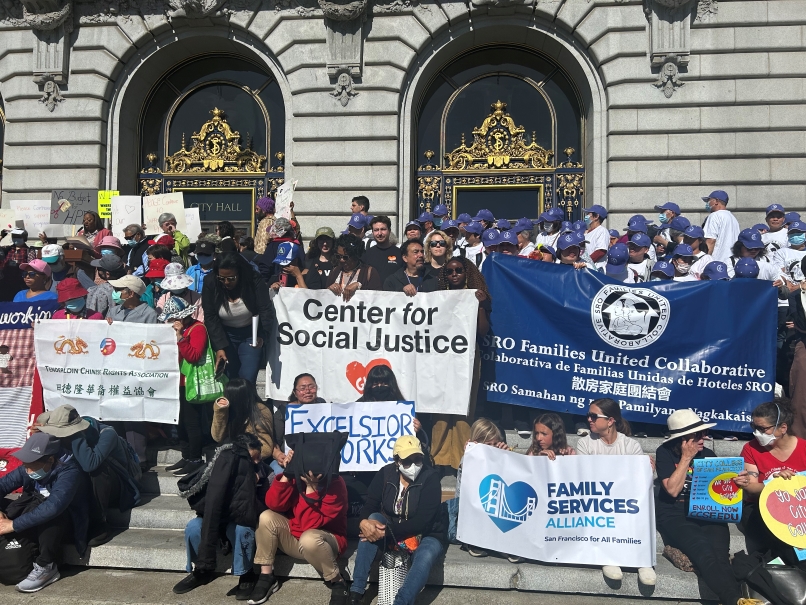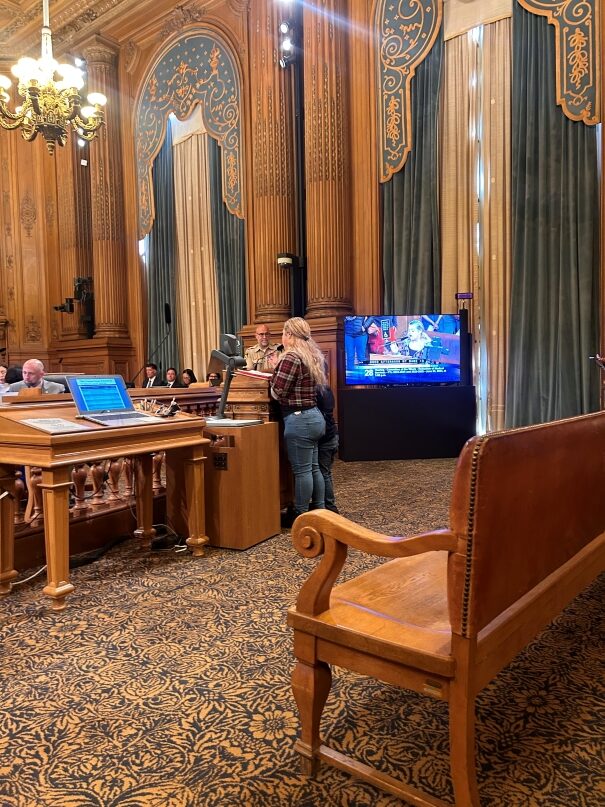
GLIDE started the Social Justice Academy (SJA) as a community learning center to catalyze the wisdom and expertise of those affected by systemic inequities.
In April, we launched our inaugural cohort of nine women, each of whom has experienced systemic inequities like homelessness or incarceration. Over the past 12 weeks, the cohort has met weekly to practice and grow as community organizers and policy advocates.
The last several weeks of the program have focused on City Hall. We started by scheduling meetings with the District 5 Supervisor, Dean Preston, and staff from the Mayor’s Office. Supervisor Preston told us about his office’s work protecting renters and keeping them in their homes.
At the Mayor’s Office, we talked about improvements for San Francisco’s transportation system. The cohort also got a peek at life working inside of City Hall.
Last week, the group returned to City Hall to put our advocacy skills into practice. We were there to do a “walk-around,” knocking on the door of each supervisor and asking them to meet with us briefly about our issue. We first gathered in the North Light Court to review our agendas.
The issue we were advocating for was city funding for the next cohort of the Social Justice Academy, which is currently at risk of being cut. The women split into groups of three and started to workshop their stories. Each one brought moments from the last three months that illustrated to them why this program was so important. One shared she had been doing advocacy for 25 years but gained the confidence to do it in-person only through this program. Another shared that she hadn’t even considered herself an advocate for her community before joining.
After working in small teams, we gathered in a large circle to practice in front of each other. Our Advocacy Manager, Erick Arguello, was our mock supervisor. The nerves were very real, but each person was excited to tell their story.
We workshopped our presentations all together, then went upstairs to knock on supervisors’ doors. We talked to the staff of four supervisors, including two heading this year’s budget. In each office, a different woman took the lead explaining our program and our goals for being there. Then the group shared their stories about how the program affected them. By the end of the visit, the group was already brainstorming next steps to keep up the pressure.

SJA participant Shirley Leiva speaking to the San Francisco Board of Supervisors to not cut public health programs, including the Black Health Community Action Team
This program has provided a route forward for many community members who have been denied opportunities to be leaders. “I have learned about not only advocacy for childcare and education but also for hunger, for those who are formally incarcerated, and about re-entry, addiction and how to keep people healthy. I have learned how to fight the right way in words,” said fellow Margaret Wilson.
“I remember asking myself one day while I sat in the cell, what can I do to help? For fellow inmates that were with me but had no voice. And when I came out of Santa Rita County jail in Alameda, I got connected to Glide for the Social Justice Academy. It turned my spirit. It turned my mind and inspired me so that I can have a voice on behalf of my fellow formerly incarcerated and those that are still incarcerated that do not have a voice.”
We will focus on community-based research in the next few weeks before graduation. Fellows will explore surveys, focus groups, and document-based research as tools for conducting their own research and developing solutions to the problems they see facing their communities.
Fellows have also made time outside of our weekly meetings to do a range of activities: voter education at San Francsico’s Juneteenth parade, lobbying in Sacramento for food access, and rallying for HIV services and programs. They’ve networked with other leaders, experienced different types of work, and grown confidence as advocates.
Workshops on topics like social media for advocacy and telling your personal story have helped fellows develop their own style and understanding of advocacy work. And the group learns just as much from each other every week as they do from presenters. It’s a special group who are never afraid to ask questions, give their opinions, and show how much they care.
“The Women’s Social Justice Academy offered many opportunities to network with inspirational women leaders from various sectors,” said Shauneke Roberson.
Summing up her experience, Shauneke had this to say: “Through guest lectures, panel discussions, and informal meet-and-greet sessions, I connected with activists, policymakers, and entrepreneurs who are making significant strides in social justice. These interactions were invaluable, as they provided me with insights into different career paths, the challenges these leaders have faced, and the strategies they have employed to overcome them. This experience broadened my perspective and motivated me to pursue my goals with renewed determination.”
To protect the funding for the next cohort of the Social Justice Academy, which is in danger of being cut from the city budget, please send an email to the Board of Supervisors using this link.
Ian James
Community Engagement Manager
GLIDE
